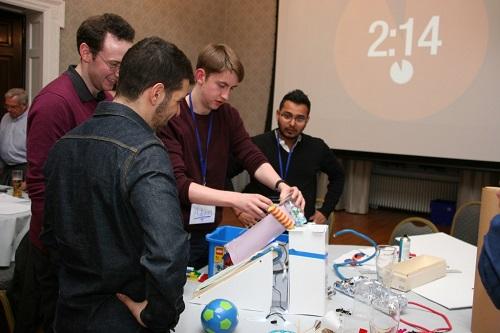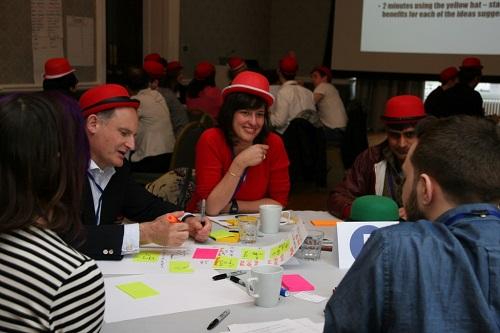Creativity Sandpit with the CDT HiPEDS and CDT AIMS
Creativity Sandpit: Novel Communication and Navigation in Distributed Multi-agent Uncertain Environments

The CDT in Pervasive Parallelism joined colleagues from the EPSRC CDTs in High Performance Embedded and Distributed Systems (HiPEDS at Imperial College London) and Autonomous Intelligent Machines and Systems (AIMS at University of Oxford) for a Creativity Sandpit on the topic of: novel communication and navigation in distributed multi-agent uncertain environments.
The event, expertly facilitated by the team from Knowinnovation, was hosted by the Easthampstead Park Conference Centre near Bracknell. The CDT PPar was represented by eight of our students and Co-Director Murray Cole.
Proceedings were centred around three industrial challenges, each devised and mentored by a representative of a leading company in the area:
- David Sharp (Ocado) presented the problem of routing item-picker robots in Ocado’s warehouse set-up. This rapidly becomes challenging as the size of the warehouse, the number of robots and the practical constraints of real systems scale up.
- Nathan Chong (ARM) challenged the students to consider the application space opening up in the Internet-of-Things era, and the ethical, legal and social issues which arise in addition to the technical challenges.
- Walt Aldred (Schlumberger) described the problems and issues arising in deep-mining situations, in which the equipment needs to become more autonomous in the face of uncertainty and extreme conditions, seconds per bit, not bits per second.

The students formed fluid inter-disciplinary, inter-institutional groups to brainstorm on these topics, presenting their developing ideas back to the meeting. Prof Peter Childs of the Dyson School of Design Engineering at Imperial presented a masterclass on creativity, and there was a lighter group exercise on designing and building a machine to fire party poppers, using only the elements of an eclectic collection of bits and pieces.
